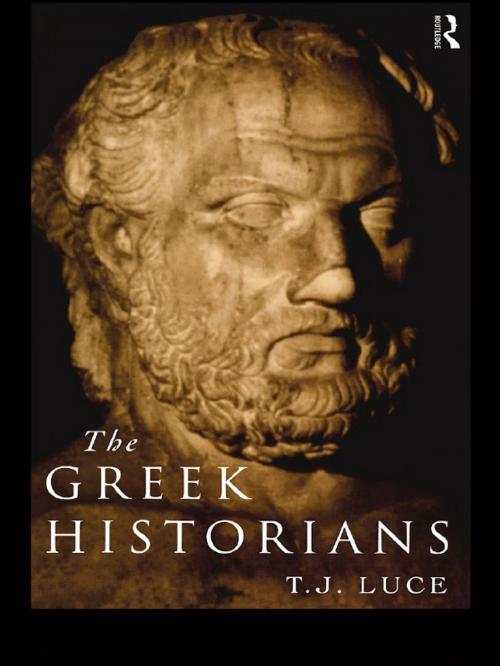| Author: | T. James Luce | ISBN: | 9781134845354 |
| Publisher: | Taylor and Francis | Publication: | September 11, 2002 |
| Imprint: | Routledge | Language: | English |
| Author: | T. James Luce |
| ISBN: | 9781134845354 |
| Publisher: | Taylor and Francis |
| Publication: | September 11, 2002 |
| Imprint: | Routledge |
| Language: | English |
The Greeks invented history as a literary genre in the fifth century B.C. The first historians owed much to Homer and adopted his vivid and direct style in narrating historical events. Yet, despite the influence of Homer the birth of history was basically a reaction against mythical accounts of the past. Homer wrote about war and travel in foreign lands, in the distant and mythical past. In contrast, the Greek historians of the fifth century wrote about contemporary or very recent events, where eye witnesses could be interviewed and facts checked.
The Greek Historians follows the development of history from Herodotus, via Thucydides, Xenophon and Polybius, until the Hellenistic age. It introduces the individual writers and their topics, yet it also outlines their attitudes to historiography and their criticisms of each other. Such themes as the uses and value of truth and causation are traced, as well as the growing constraints on free speech under Hellenistic monarchs and the Romans. Written in an accessible and captivating manner, with suggestions for further reading, this book serves as a lucid introduction to Greek historians and writing of history.
The Greeks invented history as a literary genre in the fifth century B.C. The first historians owed much to Homer and adopted his vivid and direct style in narrating historical events. Yet, despite the influence of Homer the birth of history was basically a reaction against mythical accounts of the past. Homer wrote about war and travel in foreign lands, in the distant and mythical past. In contrast, the Greek historians of the fifth century wrote about contemporary or very recent events, where eye witnesses could be interviewed and facts checked.
The Greek Historians follows the development of history from Herodotus, via Thucydides, Xenophon and Polybius, until the Hellenistic age. It introduces the individual writers and their topics, yet it also outlines their attitudes to historiography and their criticisms of each other. Such themes as the uses and value of truth and causation are traced, as well as the growing constraints on free speech under Hellenistic monarchs and the Romans. Written in an accessible and captivating manner, with suggestions for further reading, this book serves as a lucid introduction to Greek historians and writing of history.















